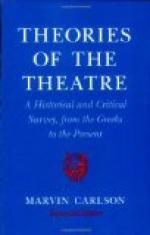There are, in the main, two ways in which this appeal may be made effectively. The first is by imitation of what we have already seen around us; and the second is by suggestion of what we have already experienced within us. We have seen people who were like Hedda Gabler; we have been people who were like Hamlet. The drama of facts stimulates us like our daily intercourse with the environing world; the drama of ideas stimulates us like our mystic midnight hours of solitary musing. Of the drama of imitation we demand that it shall remain appreciably within the limits of our own actual observation; it must deal with our own country and our own time, and must remind us of our daily inference from the affairs we see busy all about us. The drama of facts cannot be transplanted; it cannot be made in France or Germany and remade in America; it is localised in place and time, and has no potency beyond the bounds of its locality. But the drama of suggestion is unlimited in its possibilities of appeal; ideas are without date, and burst the bonds of locality and language. Americans may see the ancient Greek drama of Oedipus King played in modern French by Mounet-Sully, and may experience thereby that inner overwhelming sense of the sublime which is more real than the recognition of any simulated actuality.
The distinction between the two sources of appeal in drama may be made a little more clear by an illustration from the analogous art of literature. When Whitman, in his poem on Crossing Brooklyn Ferry, writes, “Crowds of men and women attired in the usual costumes!”, he reminds us of the environment of our daily existence, and may or may not call forth within us some recollection of experience. In the latter event, his utterance is a failure; in the former, he has succeeded in stimulating activity of mind by the process of setting before us a reminiscence of the actual. But when, in the Song of Myself, he writes, “We found our own, O my Soul, in the calm and cool of the daybreak,” he sets before us no imitation of habituated externality, but in a flash reminds us by suggestion of so much, that to recount the full experience thereof would necessitate a volume. That second sentence may well keep us busy for an evening, alive in recollection of uncounted hours of calm wherein the soul has ascended to recognition of its universe; the first sentence we may dismiss at once, because it does not make anything important happen in our consciousness.
It must be confessed that the majority of the plays now shown in our theatres do not stimulate us to any responsive activity of mind, and therefore do not permit us, in any real sense, to enjoy ourselves. But those that, in a measure, do succeed in this prime endeavor of dramatic art may readily be grouped into two classes, according as their basis of appeal is imitation or suggestion.
VI
HOLDING THE MIRROR UP TO NATURE




